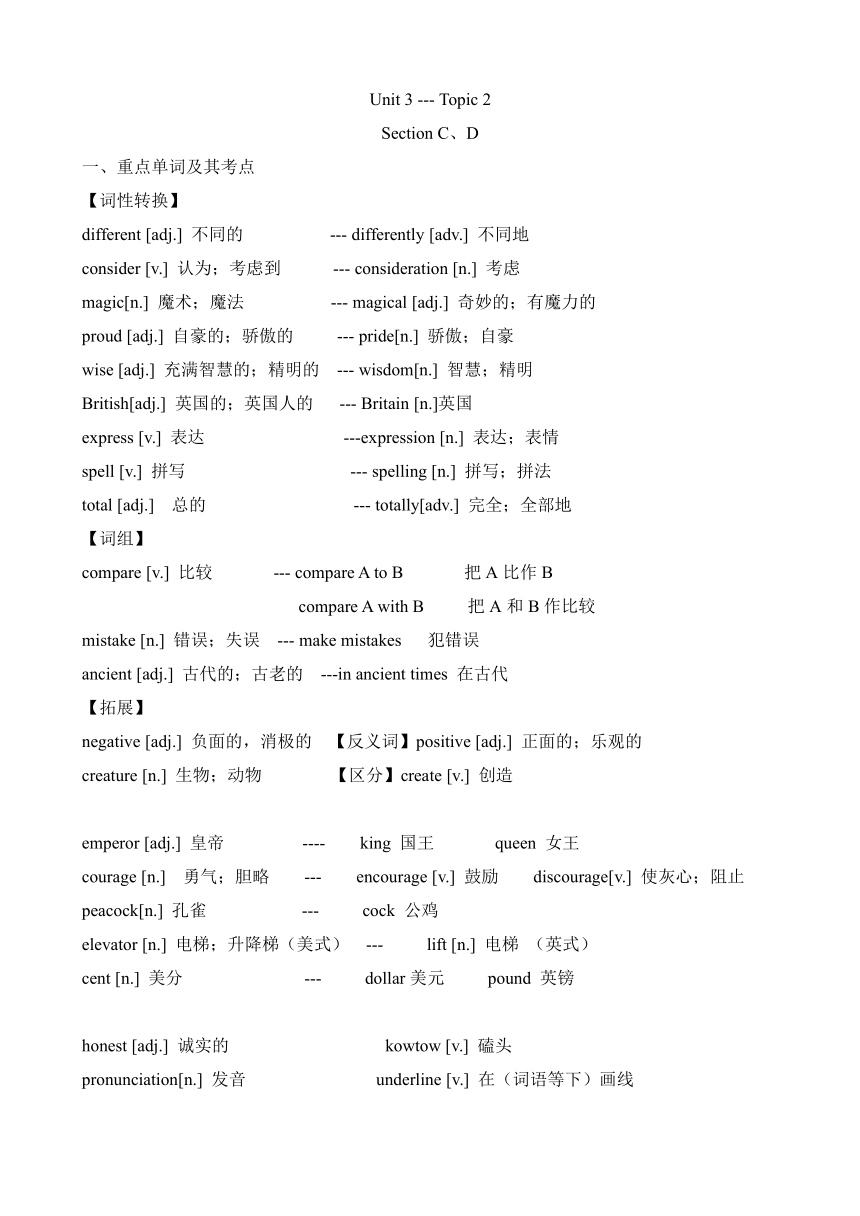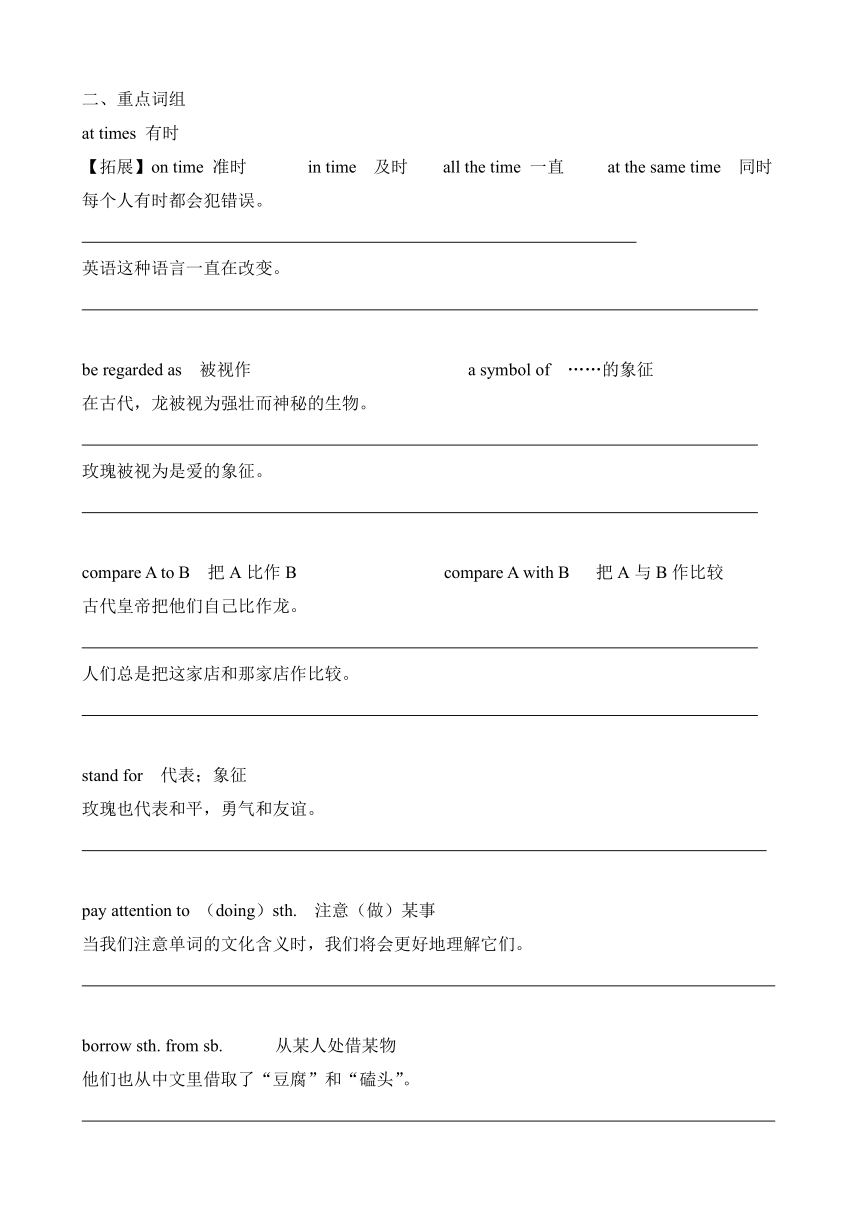Unit 3 English around the World Topic 2 Section C、D 讲义 仁爱科普版九年级英语上册
文档属性
| 名称 | Unit 3 English around the World Topic 2 Section C、D 讲义 仁爱科普版九年级英语上册 |

|
|
| 格式 | docx | ||
| 文件大小 | 22.0KB | ||
| 资源类型 | 教案 | ||
| 版本资源 | 仁爱科普版 | ||
| 科目 | 英语 | ||
| 更新时间 | 2024-10-03 14:51:39 | ||
图片预览


文档简介
Unit 3 --- Topic 2
Section C、D
一、重点单词及其考点
【词性转换】
different [adj.] 不同的 --- differently [adv.] 不同地
consider [v.] 认为;考虑到 --- consideration [n.] 考虑
magic[n.] 魔术;魔法 --- magical [adj.] 奇妙的;有魔力的
proud [adj.] 自豪的;骄傲的 --- pride[n.] 骄傲;自豪
wise [adj.] 充满智慧的;精明的 --- wisdom[n.] 智慧;精明
British[adj.] 英国的;英国人的 --- Britain [n.]英国
express [v.] 表达 ---expression [n.] 表达;表情
spell [v.] 拼写 --- spelling [n.] 拼写;拼法
total [adj.] 总的 --- totally[adv.] 完全;全部地
【词组】
compare [v.] 比较 --- compare A to B 把A比作B
compare A with B 把A和B作比较
mistake [n.] 错误;失误 --- make mistakes 犯错误
ancient [adj.] 古代的;古老的 ---in ancient times 在古代
【拓展】
negative [adj.] 负面的,消极的 【反义词】positive [adj.] 正面的;乐观的
creature [n.] 生物;动物 【区分】create [v.] 创造
emperor [adj.] 皇帝 ---- king 国王 queen 女王
courage [n.] 勇气;胆略 --- encourage [v.] 鼓励 discourage[v.] 使灰心;阻止
peacock[n.] 孔雀 --- cock 公鸡
elevator [n.] 电梯;升降梯(美式) --- lift [n.] 电梯 (英式)
cent [n.] 美分 --- dollar美元 pound 英镑
honest [adj.] 诚实的 kowtow [v.] 磕头
pronunciation[n.] 发音 underline [v.] 在(词语等下)画线
二、重点词组
at times 有时
【拓展】on time 准时 in time 及时 all the time 一直 at the same time 同时
每个人有时都会犯错误。
英语这种语言一直在改变。
be regarded as 被视作 a symbol of ……的象征
在古代,龙被视为强壮而神秘的生物。
玫瑰被视为是爱的象征。
compare A to B 把A比作B compare A with B 把A与B作比较
古代皇帝把他们自己比作龙。
人们总是把这家店和那家店作比较。
stand for 代表;象征
玫瑰也代表和平,勇气和友谊。
pay attention to (doing)sth. 注意(做)某事
当我们注意单词的文化含义时,我们将会更好地理解它们。
borrow sth. from sb. 从某人处借某物
他们也从中文里借取了“豆腐”和“磕头”。
even worse 更糟糕的是 = what’s worse
更糟糕的是,我不会理解他们的一些身体语言。
deal with 处理
我能处理这些问题。
make mistakes 犯错误 mistake A for B 把A错认为B
在过去我犯了许多错误。
昨天在公园把我一个人错认为Jim。
a homeless dog 丧家之犬 a mad dog 疯狗(喻指暴躁的人)
a running dog 走狗 a dog catching a mouse 狗拿耗子
play the peacock 沾沾自喜(炫耀自己) proud as a peacock 目空一切(极度骄傲)
三、重点句子
1. Here are some words about animals that are used differently in western cultures and Chinese cultures.
以下是一些在西方文化和中国文化中使用不同的动物词汇。
【句子分析】that引导的句子是 从句
先行词 引导词
2. In western cultures, dogs are considered honest and good friends of humans.
【consider的用法】
1)consider (doing) sth. 考虑做某事
2)consider + that从句 考虑……
3)consider to do sth. 考虑做某事
4)consider sb./ sth. (as) sth. 视某人/某物为…= regard sb. / sth. as sth = think of ……as sth.
3. It began in England but spread as the British people left their country and made new home.
它起源于英格兰,但是在英国人离开他们的国家、建设新家园的时候传播。
【动词】spread ---spread --- spread
【句子分析】主语 ,谓语1 ,in England 做 .
谓语2 .
as引导的句子是时间状语从句,意为“当……时”
as the British people left their country
and made new home .
4. It is possible to tell whether a person is American or British by listening to his or her speech.
通过听他/她说话,就可以辨别出他/她是美国人还是英国人。
【熟词生义】tell [v.] 辨别
【从句】whether引导 从句
语法——现在进行时表示将来
一、含义:从主语的角度而言,某种行为“马上”就要发生。
【区分】I will come. 我会来的。
(只是表述come这个行为在将来的某个时间发生。)
I am coming. 我就要来了。
(表述come这个行为很快会发生。)
二、结构:主语 + be动词 + V-ing.
二、用法:
(一)表示位移类的动词;
(come; go; start / begin; move; finish/complete; leave; return; arrive; die等)
(来来 去去; 开始 搬家; 完成 离开;返回 到达;死 )
I’m leaving for Wuhan. 我就要动身去武汉了。√ 我正在动身去武汉。×
She’s dying. 她就要死了。√ 她正在死。×
Jim is finishing his homework. Jim就要完成他的作业了。√ Jim正在完成他的作业。×
(二)在否定句中,多包含有“决心”的意思。
I’m not going. 我不走了。
I’m not waiting any longer. 我不再等了。
(三)在于对方讲话时,用现在进行时表示将来,多有命令的含义,但是语气相对温和。
You’re staying. 你留下来吧。
Don’t forget, you are taking part ,too. 不要忘记,你也要参加。
Section C、D
一、重点单词及其考点
【词性转换】
different [adj.] 不同的 --- differently [adv.] 不同地
consider [v.] 认为;考虑到 --- consideration [n.] 考虑
magic[n.] 魔术;魔法 --- magical [adj.] 奇妙的;有魔力的
proud [adj.] 自豪的;骄傲的 --- pride[n.] 骄傲;自豪
wise [adj.] 充满智慧的;精明的 --- wisdom[n.] 智慧;精明
British[adj.] 英国的;英国人的 --- Britain [n.]英国
express [v.] 表达 ---expression [n.] 表达;表情
spell [v.] 拼写 --- spelling [n.] 拼写;拼法
total [adj.] 总的 --- totally[adv.] 完全;全部地
【词组】
compare [v.] 比较 --- compare A to B 把A比作B
compare A with B 把A和B作比较
mistake [n.] 错误;失误 --- make mistakes 犯错误
ancient [adj.] 古代的;古老的 ---in ancient times 在古代
【拓展】
negative [adj.] 负面的,消极的 【反义词】positive [adj.] 正面的;乐观的
creature [n.] 生物;动物 【区分】create [v.] 创造
emperor [adj.] 皇帝 ---- king 国王 queen 女王
courage [n.] 勇气;胆略 --- encourage [v.] 鼓励 discourage[v.] 使灰心;阻止
peacock[n.] 孔雀 --- cock 公鸡
elevator [n.] 电梯;升降梯(美式) --- lift [n.] 电梯 (英式)
cent [n.] 美分 --- dollar美元 pound 英镑
honest [adj.] 诚实的 kowtow [v.] 磕头
pronunciation[n.] 发音 underline [v.] 在(词语等下)画线
二、重点词组
at times 有时
【拓展】on time 准时 in time 及时 all the time 一直 at the same time 同时
每个人有时都会犯错误。
英语这种语言一直在改变。
be regarded as 被视作 a symbol of ……的象征
在古代,龙被视为强壮而神秘的生物。
玫瑰被视为是爱的象征。
compare A to B 把A比作B compare A with B 把A与B作比较
古代皇帝把他们自己比作龙。
人们总是把这家店和那家店作比较。
stand for 代表;象征
玫瑰也代表和平,勇气和友谊。
pay attention to (doing)sth. 注意(做)某事
当我们注意单词的文化含义时,我们将会更好地理解它们。
borrow sth. from sb. 从某人处借某物
他们也从中文里借取了“豆腐”和“磕头”。
even worse 更糟糕的是 = what’s worse
更糟糕的是,我不会理解他们的一些身体语言。
deal with 处理
我能处理这些问题。
make mistakes 犯错误 mistake A for B 把A错认为B
在过去我犯了许多错误。
昨天在公园把我一个人错认为Jim。
a homeless dog 丧家之犬 a mad dog 疯狗(喻指暴躁的人)
a running dog 走狗 a dog catching a mouse 狗拿耗子
play the peacock 沾沾自喜(炫耀自己) proud as a peacock 目空一切(极度骄傲)
三、重点句子
1. Here are some words about animals that are used differently in western cultures and Chinese cultures.
以下是一些在西方文化和中国文化中使用不同的动物词汇。
【句子分析】that引导的句子是 从句
先行词 引导词
2. In western cultures, dogs are considered honest and good friends of humans.
【consider的用法】
1)consider (doing) sth. 考虑做某事
2)consider + that从句 考虑……
3)consider to do sth. 考虑做某事
4)consider sb./ sth. (as) sth. 视某人/某物为…= regard sb. / sth. as sth = think of ……as sth.
3. It began in England but spread as the British people left their country and made new home.
它起源于英格兰,但是在英国人离开他们的国家、建设新家园的时候传播。
【动词】spread ---spread --- spread
【句子分析】主语 ,谓语1 ,in England 做 .
谓语2 .
as引导的句子是时间状语从句,意为“当……时”
as the British people left their country
and made new home .
4. It is possible to tell whether a person is American or British by listening to his or her speech.
通过听他/她说话,就可以辨别出他/她是美国人还是英国人。
【熟词生义】tell [v.] 辨别
【从句】whether引导 从句
语法——现在进行时表示将来
一、含义:从主语的角度而言,某种行为“马上”就要发生。
【区分】I will come. 我会来的。
(只是表述come这个行为在将来的某个时间发生。)
I am coming. 我就要来了。
(表述come这个行为很快会发生。)
二、结构:主语 + be动词 + V-ing.
二、用法:
(一)表示位移类的动词;
(come; go; start / begin; move; finish/complete; leave; return; arrive; die等)
(来来 去去; 开始 搬家; 完成 离开;返回 到达;死 )
I’m leaving for Wuhan. 我就要动身去武汉了。√ 我正在动身去武汉。×
She’s dying. 她就要死了。√ 她正在死。×
Jim is finishing his homework. Jim就要完成他的作业了。√ Jim正在完成他的作业。×
(二)在否定句中,多包含有“决心”的意思。
I’m not going. 我不走了。
I’m not waiting any longer. 我不再等了。
(三)在于对方讲话时,用现在进行时表示将来,多有命令的含义,但是语气相对温和。
You’re staying. 你留下来吧。
Don’t forget, you are taking part ,too. 不要忘记,你也要参加。
同课章节目录
- Unit 1 The Changing World
- Topic 1 Our country has developed rapidly.
- Topic 2 The population in developing countries is
- Topic 3 The world has changed for the better.
- Unit 2 Saving the earth.
- Topic 1 Pollution has causes too many problems.
- Topic 2 All these problems are very serious.
- Topic 3 What can we do to protect the environment
- Unit 3 English around the World
- Topic 1 English is widely spoken around the world.
- Topic 2 Some things usually have different meaning
- Topic 3 Could you give us some advice on how to l
- Unit 4 Amazing Science
- Topic 1 When was it invented?
- Topic 2 I'm excited about the things that will be
- Topic 3 China is the third nation that sent a pers
